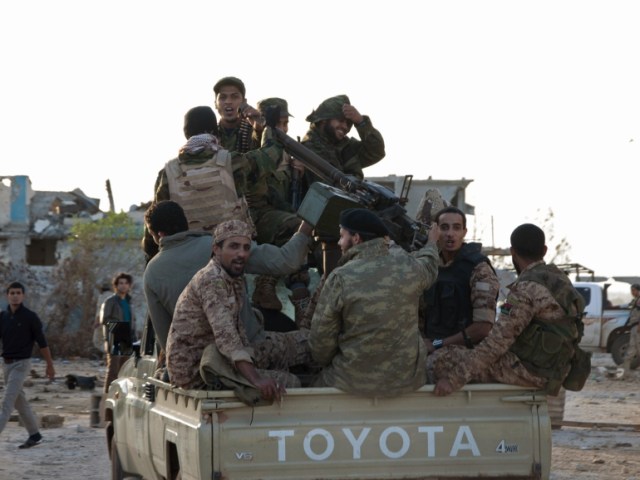Military sources reported that the Libyan government of Al-Wefaq government forces extended their control south of the capital in an area adjacent to the Tripoli airport, while the forces of retired Major General Khalifa Haftar continued to retreat. Meanwhile, details of a failed mission of British mercenaries were revealed to Haftar earlier.
Military sources from the Al-Wefaq government said that their forces had made progress in the axes of Ain Zara and Wadi Al-Rabi`, south of the capital, Tripoli, and had taken control of large parts of the mixers axis adjacent to the capital's airport.
The sources confirmed the continued retreat of Haftar's forces towards the Qasr Bin Ghashir area adjacent to the south of the capital, noting that this continued retreat came after the withdrawal of the mercenaries of the Russian Wagner Company, which was overseeing the combat operations south of Tripoli, in addition to what Haftar's forces suffer from a shortage of ammunition and the withdrawal of a number Of its fighters.
Meanwhile, two children and one other person were wounded in the shelling by Haftar forces in the Ain Zara area, south of Tripoli, according to a medical source.
Al-Wefaq government forces have made important military progress during the last period (Reuters)
Retreat and fight
For his part, the military commander of the Al-Wefaq forces, Muhammad al-Qal’aw, said that Haftar's forces were retreating in the fighting axes south of the capital, Tripoli, and were trying to assemble their ranks and bring those whom he described as Sudanese mercenaries from the Janjaweed factions to fight with them.
Al-Qala'w added that Al-Wefaq forces fully controlled the areas surrounding the Yarmouk and missile camps south of Tripoli.
According to Al-Jazeera correspondent in Tripoli, Nasser Shadid, the Al-Wefaq forces are fighting in the Electricity Triangle in Ain Zara, and if they manage to control this place, it will be easy to include the axes of Ain Zara and Wadi Al-Rabeeh, which will force Haftar's forces to retreat to the Thursday market area of Amisel or to the Qasr Bin Ghashir area.
And the correspondent indicated that this matter means the expulsion of Haftar forces out of the administrative borders of the capital, Tripoli, which means not being able to bomb them, not with Grad rockets or even with howitzers.
He pointed out that what greatly hinders the progress of the Al-Wefaq government is the mines that Haftar forces left behind.
Contacts of the US ambassador
On the other hand, the head of the Zintan municipality, Mustafa Al-Barouni, confirmed the Libyans ’desire in the western region to see an end to the Haftar forces’ attack on Tripoli. This came during a telephone conversation with the United States Ambassador to Libya Richard Norland.
Norland said that the United States shares this goal with the Libyans, and that only a comprehensive political process can achieve peace and stability in Libya, adding that the US Agency for International Development is ready to work with the mayor of Zintan to tackle the municipality's challenges.
Zintan is the largest military force in the western mountain southwest of Tripoli, as its military council supports the legitimate government, as well as its municipal council, most of its deputies, members of the House of Representatives and the state and its social components.
Invitations and obstacles
Politically, the US delegate to the United Nations, Kelly Kraft, said that all external actors should stop fueling the conflict in Libya, asking all countries to comply with the arms embargo and withdraw all mercenaries.
And Kraft considered that the political solution sought by the United Nations, is the way to achieve stability in Libya.
For his part, the European Union's foreign affairs representative, Josep Borrell, said that the union is working towards achieving a ceasefire in Libya and that the numerous agendas are a major obstacle to that.
In a speech to the UN Security Council, Borrell added that the Irene Navy operation to monitor the implementation of the arms embargo in Libya is successful and will continue.
For his part, Malta's Prime Minister, Robert Abella, affirmed his country's support for the Al-Wefaq government and its refusal to attack Tripoli, stressing the need to return to the path of a political solution. This came in a meeting with the President of the Presidential Council of the National Accord Government, Fayez al-Sarraj, in the capital, Tripoli.
British mercenaries
Meanwhile, the British newspaper "Daily Telegraph" said that British mercenaries were involved in a process it described as failing to support retired Libyan Major General Khalifa Hifter, according to a secret United Nations report.
The newspaper revealed that the operation involved former soldiers from the British Royal Navy commandos.
The report mentioned the participation of five men and a woman in the operation, which ended in the team's escape on an "amazing" trip across the sea, after they disagreed with the Libyan party that they were going to fight on their behalf.
The newspaper reported that the British commandos traveled within a group of twenty mercenaries to Benghazi in eastern Libya last June, as part of a contract organized by the Emirates-based company, "UPS", according to the UN report seen by the newspaper.
The report stated that British businesswoman residing in the Emirates Amanda Perry was the mediator in the project. The cover of the process, called the "Opus Project", was a geophysical and class study in Jordan.
The UN report says that these mercenaries were hired by Khalifa Haftar and his forces to command helicopters, speed boats and intercept Turkish ships loaded with military supplies to the National Accord government in Tripoli.

